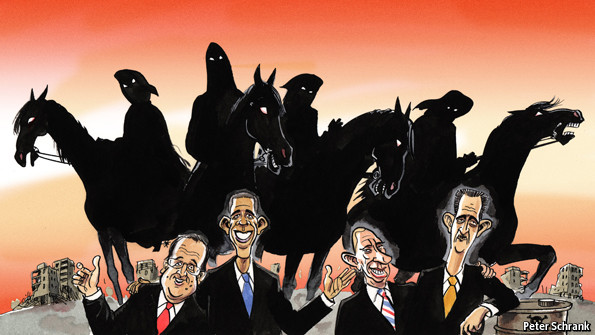An unlikely band of brothers

A deal struck by America and its allies with Russia envisages the removal of Syrian chemical weapons amid a civil war
Sep 21st 2013 | CAIRO AND MOSCOW | From the print edition
KAFR NABL, a small town in north-west Syria, fell under rebel control early in the 30-month civil war. It has since gained fame as a scruffy Hollywood-in-a-bomb-shelter, turning out satirical videos about the war. The latest shows a rabble of angry cavemen charging repeatedly out of their caves only to be mown down by machine guns or blown up by bombs while Western and Arab spectators look on nonchalantly. When, after a third charge, these “savages” drop dead from a chemical spray, the audience objects. A character holding a Russian flag appears and hands the empty poison canister to the applauding onlookers. The cavemen protest but the slaughter resumes, now with bullets and bombs.
For now at least, this seems a fairly accurate portrayal of how things are going in Syria. The world is confused by it. It is squabbling over clobbering Syria for using gas and perplexed by the Syrian government’s sudden pledge on September 10th to give up chemical weapons it had previously denied owning. Western countries are in talks with the government’s protector, Russia; a report from UN inspectors on September 16th confirmed the use of sarin gas against Syrian civilians last month. But as diplomatic skirmishing over plans to dismantle Syria’s poison gas programme intensifies, the chances for peace on the ground, or even for a lull in the fighting that has so far left at least 110,000 Syrians dead and 6m homeless, seem remote.
Taking advantage of the lifting of any immediate threat of international punishment, the defiant regime of Syria’s president, Bashar Assad, has resumed and escalated artillery, air and infantry assaults on rebel-held suburbs of the capital, Damascus. Fierce battles rage elsewhere in the country, helping account for the 2,000-plus deaths from conventional weapons recorded since August 21st, the date of chemical attacks on two Damascus suburbs. Disparate rebel groups have in recent weeks made small inroads against the government in the east, south and north, including near the town of Safira, the suspected site of a chemical-weapons plant. But they are also increasingly fighting among themselves.
Kurdish militias in the north-east, keen on delineating their own ethnic region, have engaged in bloody clashes against the Islamic State of Iraq and Syria (ISIS), a radical affiliate of al-Qaeda. ISIS has fought local rebel militias in several cities along the Euphrates valley, which bisects central Syria, and on September 18th launched a full-scale assault to wrest control of Azaz, a town near the Turkish border that straddles access routes to Syria’s second city, Aleppo, from a group supported by Western and Arab Gulf countries.
http://www.economist.com/news/middle-east-and-africa/21586600-deal-struck-america-and-its-allies-russia-envisages-removal
